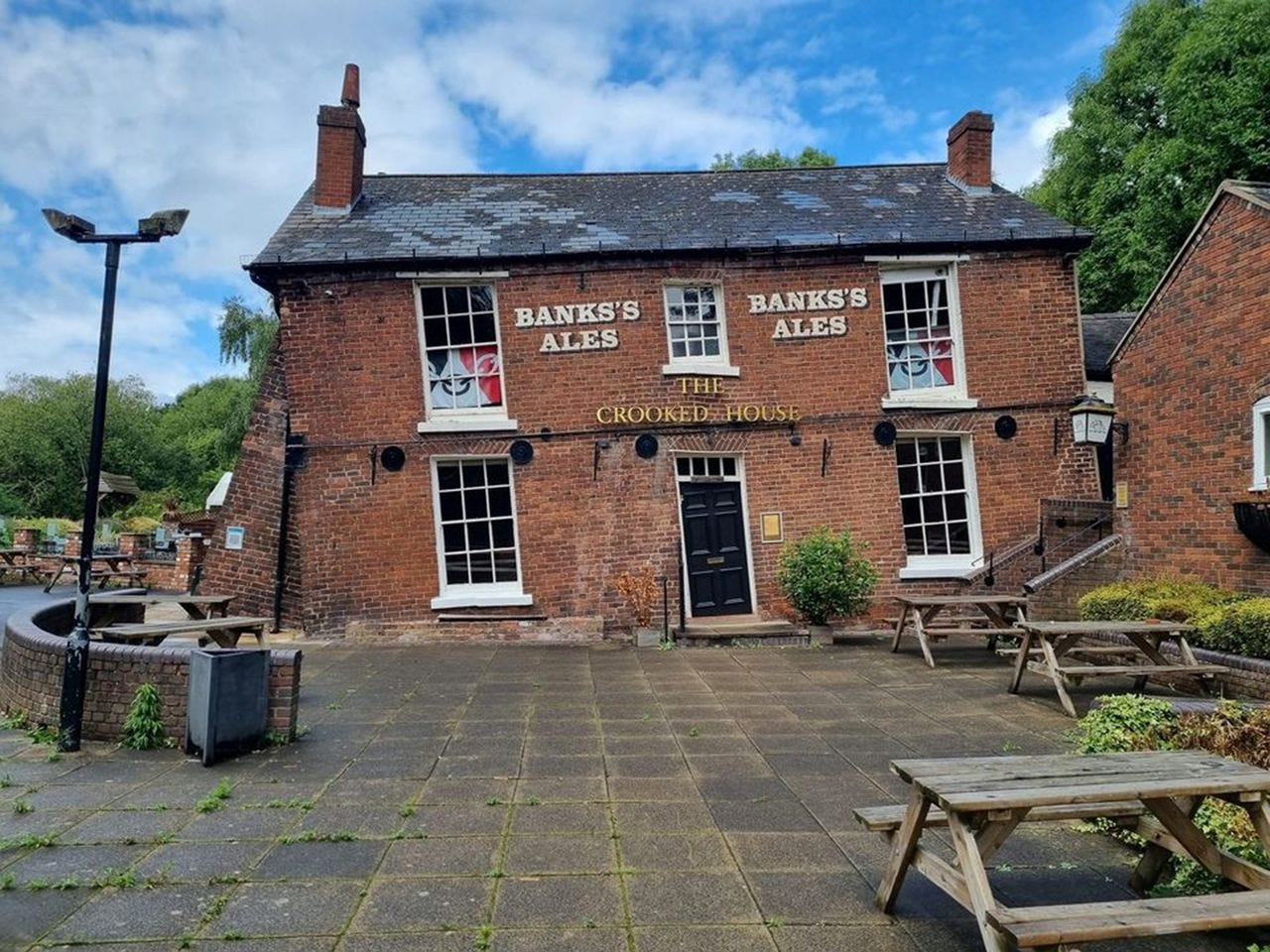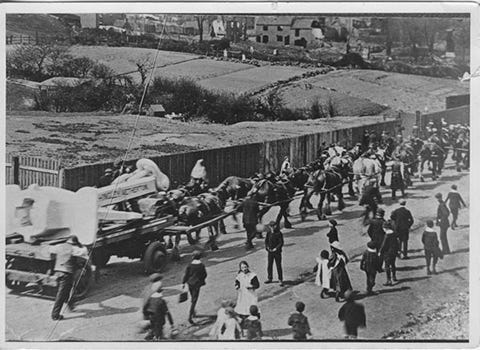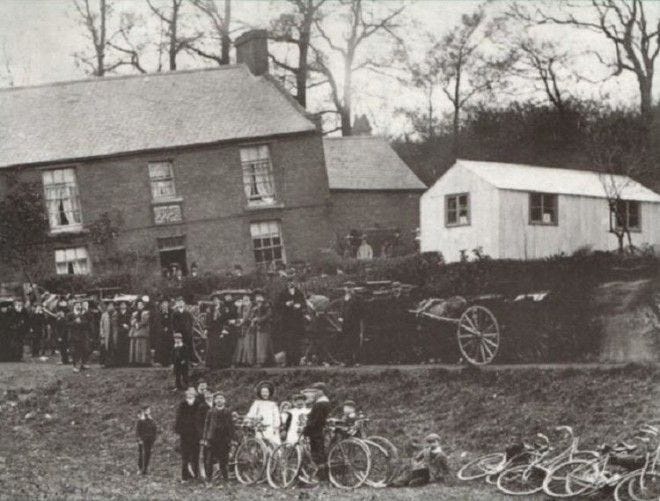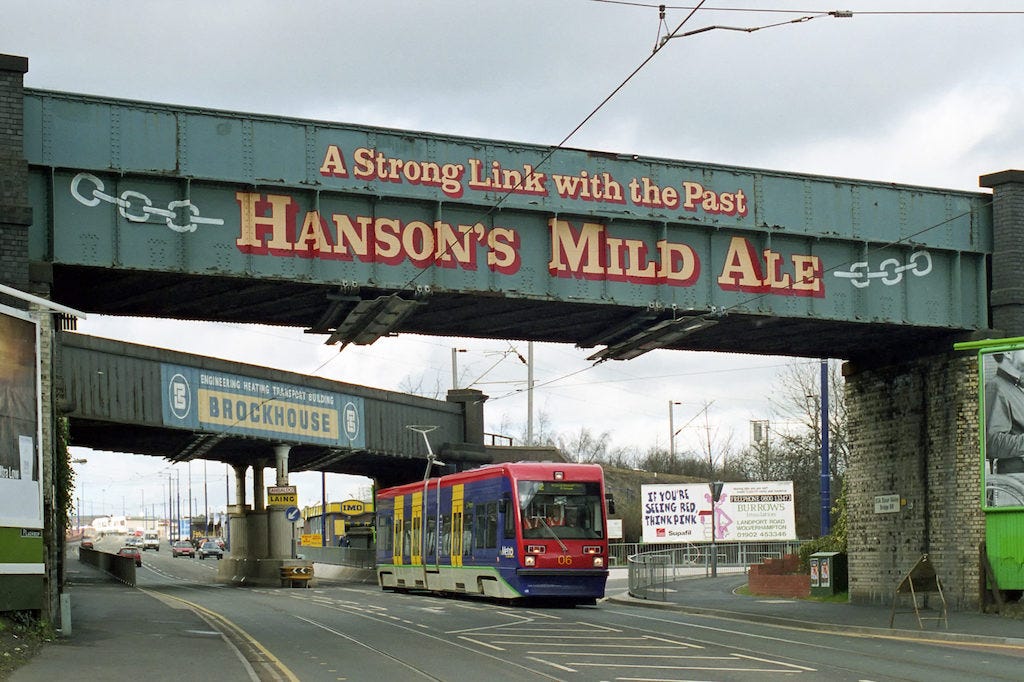Hello and welcome back to Coffee with Clio!
Endings and beginnings and why it's all about history
I promised a few weeks ago that I’d be taking a break and I’m still adjusting to the fact that I really have now finished my book! After more than a decade working on it, I’m super excited to get going on new things.
Over the next few weeks I’ll tell you a little bit more about the next book I’m psyched to start, but today I want to begin somewhere else: with a funeral, a memorial, a reflection on things past and what they mean.
You see, while I was on holiday, on our seventh day away, a picture popped onto my phone screen. My heart skipped a beat. I waited for the headline to load, hoping it would tell me I was wrong. It didn’t: ‘The Crooked House: fire rips through famed ‘wonky’ pub’.

Over the following days the news got worse. Earth had been piled on the road to the pub before the fire, so emergency services couldn’t reach it. Then, just twenty-four hours later, the whole building was flattened to rubble. Nobody knew what had happened but everyone agreed that nobody had given permission for this. It was an affront. An offence (whether legally or not). An injury. It hurt.
I called my mother. ‘It sounds silly,’ she said, ‘but when I saw the news I thought that I’m glad you all went there after your Uncle Eddie’s funeral’. It didn’t sound silly to me. I had thought the same thing.
My uncle died earlier this year. After his funeral, a whole group of the family wanted to carry on catching up after the official gathering. ‘Why don’t we go to the Crooked House?’ It was a magical afternoon, despite the circumstances, or perhaps because of them.
Uncle Eddie was a proud Black Country man (pronounced ‘mon’ in the local dialect). I don’t know if he was there the first time I saw the Crooked House, but probably. I remember I was very small. At his wake it was wonderful watching his grandchildren and grand-nieces and -nephews, from slightly-too-cool-for-school teenagers to little ones standing on chairs to reach, rolling marbles down the famous windowsill: the building was so crooked that it looked as if the marble was rolling uphill. We told stories, laughed and just enjoyed being with each other.
For the record, none of us belong to the core community that this remarkable pub served. For the people of Dudley and Himley, the loss will be felt even more painfully, but it meant something and I only realised how much when it was gone.

There is now a campaign to have the pub rebuilt. (You can support it here.) People have been asked not to speculate online about the exact circumstances behind the demolition, so I will refrain, except to say that I hope West Midlands Mayor Andy Street was right when he said whoever was responsible ‘has messed with the wrong pub, the wrong community’.
What I want to think about instead is the nexus of heritage, memory, history and identity that the Crooked House represents for me as a historian. I’ve written about heritage before (p. 215 onwards) but that only opened a box. Over time, I’ve realised there is plenty more inside.
Let me start with a bit of background. I come from Wolverhampton, a city in the midlands of England. It is part of a wider area, known as the Black Country, which is not an official unit of any kind. It is a cultural zone, united by an industrial history - the ‘Black’ came from the coal dug out of the ground and the soot from metalworking furnaces that covered everything.

When I was growing up, this was a heritage that was present all around us: derelict factories, a region-wide risk of subsidence because of unmapped mine shafts, the local dialect and mockery of it, a sense that other parts of the country looked down on us, but also a deep pride in work that had ‘built Britain’ and taken skill, determination and, often, raw courage, to perform. I grew up imbibing that the anchor on the Titanic was made nearby. (When I first told my partner this, he was a bit puzzled. ‘Why is that a good thing? The Titanic sank.’ I was puzzled in return. ‘Well, yes, but there was nothing wrong with the anchor!’)

In fairness to my youthful self, I didn’t necessarily find all of this very interesting. I wanted to be off into the world and was already interested in earlier history than the Industrial Revolution. As I’ve gotten older, things look more complicated. My impulses conflict. As a historian, especially of the fairly distant past, one instinct is to be detached. It is safer and more comfortable.
The ‘Crooked House’ was originally built as a very normal house in 1765 - practically yesterday by the lights of much of my work. It only got crooked in the nineteenth century as a result of coal mining beneath it. It became a pub in the 1830s and was only officially named ‘The Crooked House’ in 2002, though it had been called that unofficially for decades. The pub had been condemned to demolition in the 1940s, restored in the 1950s, partially burned down in the 1980s and restored…
Viewed through this historical lens - the historian’s telescope - it is a strange building to engage the emotions. It had only been in continuous use as a pub since the 1950s and had always traded in part on its ‘gimmick’. Located down a narrow country lane, if you were looking for a proper Black Country boozer, a better bet would be any number of pubs right in the heart of settlements. That is definitely what me ten years ago would have said. Nothing to see, nothing to make a fuss about. People’s reactions are interesting but a bit irrational.
We’re taught when we study the past to be wary of misuse or misrepresentation of the past and that is good advice. Less often are we asked to think about why anybody ever studies or calls on the past at all and that every time somebody does, they (we) are responding to needs in the present.
(That is, actually, by way of an *ahem* seamless pitch for my new project (the one I’ll tell you more about soon) what it is about - the whys and wherefores of studying the distant past in a series of ever more recent presents.)
What, then, about the people campaigning to have the Crooked House rebuilt? What about my own anger and sadness and gratitude for that beautiful evening after my uncle’s funeral that means one more generation of our family will remember the marble that rolled uphill? Looking at history as a place where the actors of the past and the inquirers of the present meet, with all of their combined hopes and fears, three things stand out.
First of all, it doesn’t matter that the pub, as we all knew it, had only been around since the 1950s. There can be a kind of snobbery that I’m definitely not immune to, which gives extra points to things for being older. They are more ‘authentic’. Well, as a great anthropologist once said to me, ‘authenticity is such bullshit’. He didn’t, of course, mean that everything is, or should be, fake but that often, in the quest for ‘real authenticity’ we miss that what is real is authentic.
People really did have memories and stories, spanning generations, about the Crooked House. People really did take visitors to the area to see it. Back to the 1950s is well within that special timeframe for historians - living memory - the thread between the furthest back a story the youngest member of a community can remember being told by the oldest: your grandparent, or great-grandparent, telling you or your children stories about their grandparent or great-grandparent.

Depending on average life expectancy, living memory is usually between about 70 and 150 years. It doesn’t mean that things longer ago than that don’t matter, but it does mean that somewhere around a century is a timeframe within which people are reasonably good at thinking about the past as ‘like now except with some differences’, rather than as radically unlike and perhaps disconnected from now, without some conscious effort to draw the links.
In the book that I’ve just finished, I divide up a millennium in the Western Indian Ocean into century-long chunks because it was the only way to tell a big, often quite anonymous story at something like a human scale, keeping sight of the everyday impact of systemic changes on people’s lived experiences. Time is important, but older doesn’t mean better, more real or more authentic.
Second, the Crooked House mattered because it resonated with several things in which the Black Country takes pride:
resilience (literally: it repeatedly did not fall down, even when one end of it sank four feet into a mineshaft…)
community bonds (it isn’t a country house, a stately home or a castle. Even if it probably was quite a nice farm house when it was originally built, as a pub it represents a place where everybody can go and people socialise together)
industry (bear with me here. The fact that the Crooked House was literally undermined by industry made it iconic of the region itself - transformed by processes which were dangerous, damaging and difficult, but fundamental in creating a distinctive landscape, culture and identity)
most of all, place: the Crooked House was something to be proud of because it was unlike anywhere else. After my uncle’s funeral, the Crooked House was a choice to go somewhere, not anywhere. The Black Country may not have the prettiest reputation but for those of us born and brought up there, and for many who move into the area, it is special because it is our place. As a historian, choosing not to recognise or understand that emotion in people seems to me to be missing something really important. And I know, because for a long time, I tried very hard to do exactly that.

Finally, the destruction of the Crooked House inspired the emotions that it did because the treatment of the past is often a good indicator of regard in the present. History, they say, is written by the victors and that applies within societies, as well as between them. The pasts of the haves are studied in school curricula. They are protected by laws and fences. When Notre Dame or Windsor Castle burned, nobody asked whether or not they would be restored. We took it for granted that they would be.
Without indulging in that speculation we have been warned off, it seems reasonable to observe that the Crooked House was demolished because the people responsible figured it didn’t matter. It was just some pub in a poor, post-industrial nowhere. The memories it housed, the threads it tied between generations, were not big stories with books or films about them. The furore that has followed is an assertion that the communities it served matter in the present.
I no longer live in the Black Country. I do not work in the heavy industries that made it. But I am a Black Country girl and what the Black Country tells me as a historian, with its pride in resilience, community and the ambivalent legacy of industry, is that the Crooked House matters every bit as much as Windsor or Notre Dame because the lives and histories of the people who built and used and loved it matter every bit as much as the people whose stories we are more used to hearing.
The demolition of the Crooked House was an affront because it took away something unique, familiar in the past and present to those who shared a particular place and memorable to those who saw it as visitors. Its loss makes the Black Country my niece and nephew will grow up in just a little poorer, less unique and less visibly shared with earlier generations than the Black Country I grew up in.

That is why, as a historian, I find the campaign to rebuild the Crooked House fascinating. And as a Wulfrunian (that’s somebody from Wolverhampton, because the town was founded by a medieval nun called Wulfruna, because it’s all history, see…), I hope it succeeds because one day I want to watch my niece and nephew rolling a marble uphill and tell them the story about how they burned this place down but we went and built it right back up again, brick by original brick.




